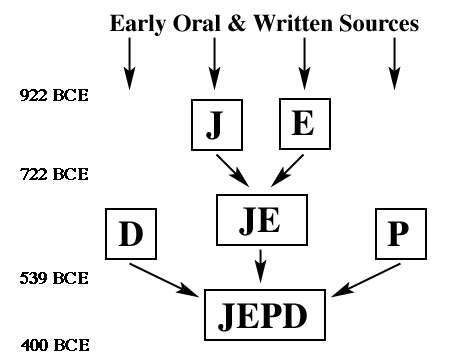Documentary Hypothesis, pt. 2
(Source material given below)
Literary analysis shows that the Pentateuch was not written by one person. Multiple strands of tradition were woven together to produce the Torah.
The view that is persuasive to most of the critical scholars of the Pentateuch is called the Documentary Hypothesis, or the Graf-Wellhausen Hypothesis, after the names of the 19th-century scholars who put it in its classic form.
Briefly stated, the Documentary Hypothesis sees the Torah as having been composed by a series of editors out of four major strands of literary traditions. These traditions are known as J, E, D, and P. We can diagram their relationships as follows.

J (the Jahwist or Jerusalem source) uses the Tetragrammaton as God's name. This source's interests indicate it was active in the southern Kingdom of Judah in the time of the divided Kingdom. J is responsible for most of Genesis.
E (the Elohist or Ephraimitic source) uses Elohim ("God") for the divine name until Exodus 3-6, where the Tetragrammaton is revealed to Moses and to Israel. This source seems to have lived in the northern Kingdom of Israel during the divided Kingdom. E wrote the Aqedah story and other parts of Genesis, and much of Exodus and Numbers.
J and E were joined fairly early, apparently after the fall of the Northern Kingdom in 722 BCE. It is often difficult to separate J and E stories that have merged.
D (the Deuteronomist) wrote almost all of Deuteronomy (and probably also Joshua, Judges, Samuel, and Kings). Scholars often associate Deuteronomy with the book found by King Josiah in 622 BCE (see 2 Kings 22).
P (the Priestly source) provided the first chapter of Genesis; the book of Leviticus; and other sections with genealogical information, the priesthood, and worship. According to Wellhausen, P was the latest source and the priestly editors put the Torah in its final form sometime after 539 BCE. Recent scholars (for example, James Milgrom) are more likely to see P as containing pre-exilic material.
Contemporary critical scholars disagree with Wellhausen and with one another on details and on whether D or P was added last. But they agree that the general approach of the Documentary Hypothesis best explains the doublets, contradictions, differences in terminology and theology, and the geographical and historical interests that we find in various parts of the Torah.
Here are some differences between the four strands of tradition.
| J |
E |
P Priestly |
D Deuteronomist |
| stress on Judah | stress on northern Israel | stress on Judah | stress on central shrine |
| stresses leaders | stresses the prophetic | stresses the cultic | stresses fidelity to Jerusalem |
| anthropomorphic speech about God | refined speech about God | majestic speech about God | speech recalling God's work |
| God walks and talks with us | God speaks in dreams | cultic approach to God | moralistic approach |
| God is YHWH | God is Elohim (till Ex 3) | God is Elohim (till Ex 3) | God is YHWH |
| uses "Sinai" | Sinai is "Horeb" | has genealogies and lists | has long sermons |
For further information about the Documentary Hypothesis and the reasons that
scholars accept it, consult the article "Torah (Pentateuch)" in the Anchor
Bible Dictionary.
Sources:
| Friedman, "Torah (Pentateuch)" in the Anchor Bible Dictionary. | |
| W. Gunther Plaut, ed., The Torah: A Modern Commentary (New York: Union of American Hebrew Congregations, 1981). | |
| Lawrence Boadt, Reading the Old Testament: An Introduction (New York: Paulist Press, 1984). |